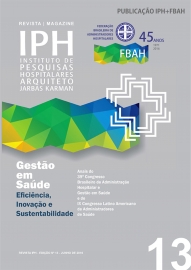Publications IPH Magazine IPH Magazine 13th: Annals Cost Reduction through Process Review

- Editorial - 13th
- HEALTH MANAGEMENT: Efficiency, Innovation and Sustainability
- Health Management Focused on Efficiency, Innovation and Sustainability!
- CONGRESS FOR COST AND FINANCIAL MANAGEMENT
- Hospitals, networks and sustainability
- Cost Reduction through Process Review
- Integrating Business Management to the Assistance Management
- International experience on the compensation models
- The Future of Hospital System - The Sustainability Challenge of Small Hospitals
- Advances in Patient Safety: Indicators and Impact on Cost Assistance
- Prospects for Public Private Partnerships and the Partnership Arrangements with Health Social - Critical Analysis of the PPP Brazilian Experiences in Health
- ENGINEERING, ARCHITECTURE AND LOGISTICS CONGRESS
- Hospital Logistics: Intelligence at Service for the Health Manager
- PEOPLE MANAGEMENT AND LEADERSHIP CONGRESS
- Illusionist Performance: Transformation and Innovation in Tough Times
- Implementation Careers & Salaries: New Paradigms and Opportunities
- The Art of Leading Generations X, Y and Z - How to retain talent?
- Giving Back Over the Organizational Climate - Talent Retention Strategies
- Creative Practices to Innovate in HR
- HEALTH MANAGMENT CONGRESS
- Efficiency
- Efficiency (2)
- The Process of Change in Bolivia "Hospital Arco Iris" from Solid Hospital to Liquid Hospital
- PATIENT'S QUALITY AND SAFETY CONGRESS
- Impact of External Assessment in Brazil
- Impact of External Assessment in Brazil (2)
- Quality and impact of patient safety in the hospital financial result - Santa Casa de Misericordia de Maceió
- Quality and Safety Integration on Education Process
- Management
- The Apthapi as Innovation Strategy in the Humanization of Healthcare Hospitality
- The experience of the State Hospital Sumaré / Unicamp in management by care
- HOSPITAL HOTEL CONGRESS
- Hospitality in Patient Perspective
- Hospitality at the Service of Humanization
- Hospitality and Humanization
- Hospitals Infrastructure Trends aimed at Physical and Mental Comfort for Patients and Families
- The Multidisciplinary Integration of Beds Management as a Way to Seek Effectiveness
- Spirituality in Hospitals Focusing on Healthcare Hospitality
Cost Reduction through Process Review
José Geraldo B. Chaves Filho
The economic moment Brazil is currently experiencing, with inflation and high interest rates, as well as increased operating costs, has caused many companies to rethink their processes in order to reduce costs and maintain their competitiveness (BENEDICT, S.L.; 2016). This is precisely the topic discussed in this study.
Losses and waste can decisively affect the performance of your health institution. We believe that more can be done with it, so we use tools and knowledge that enable the analysis of processes and the systematic and sustainable disposal of waste, whether of time, capacity, quality or cost (CHAVES FILHO, 2010).
We present the information to management and reduction of hospital costs; the use of management tools for effective reduction of costs: eliminating rework, optimization flow, reduce inventory, among others; and process management tools and the involvement of the teams in the solution and process optimization.
We recommend the standardization of care, support and management processes, investing in the review, automation and optimization thereof, eliminating everything that does not add value to the patient; the total costs and results management, seeking to increase the organization competitiveness, through the generation and proper analysis of strategic management and business information and assistance.
Focusing the solution in process management using the methodology LURE, Profit + Return for Lean Healthcare, Business Process Management, outcome indicators and Kaizen events, we present a case to demonstrate the results that can be obtained.
The addressed topics are: how was reversed the result of a hospital for an average primary surplus of more than 1 mm / month in 2015; how was the 6% reduction in monthly costs; how was reduced by 53% (R$ 653,000) the value in stock of expensive medicine in the warehouse (~ 24% of total stock); how monthly occupancy was increased of the rooms of the Surgical Center by 12%; how the queue for EV AMB Chemotherapy was reduced from 12 to zero days, keeping the occupation of 63%; how the patient will schedule appointments for a date up to 40% closer; how it gained 30% in space and 95% in agility for archiving / search records; how was the reduction from 11 to 6 days in the general average delivery time of pathological examinations (RELATÓRIO ANUAL ACCG 2015).
In the specified case, 3 macro solutions have been suggested to improve the hospital: programming of care (PCP elective consultations and QT application); reset handling and transport (layout and service personnel); and organization and resources management (forms, equipment and inventories).
At the end of the process, there was uniform distribution of patients throughout the day, schedule service, organization and resource management, expansion of service capacity, less waiting time to meet the patient and greater success in prescriptions.
Link: Lure Consultoria
José Geraldo B. Chaves Filho is Master of Science in Production Engineering Department at USP and Production Engineer - Materials UFSCar. Researcher and visiting professor at the Faculty of Technology GAP (UNIGAP), the Institute Dotis / IBEMEC and the Institute Francisco Ludovico (IFL).
Send by e-mail:


